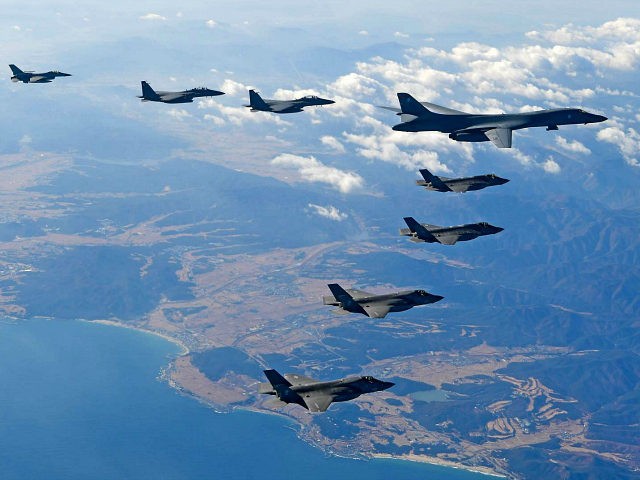General Valery Gerasimov, chief officer of the Russian military, kicked off a meeting with Japanese Defense Minister Itsunori Onodera on Monday by blaming Japan, South Korea, and the United States for increasing tensions on the Korean Peninsula with a joint military exercise.
The exercise Gerasimov referred to is a two-day missile tracking drill beginning on Monday, a week after the U.S. and South Korea completed a large-scale joint military exercise. Reuters quotes Japanese sources who described the missile tracking practice as the sixth drill since June involving information sharing about ballistic missiles. Japan is planning a sizable investment in upgraded missile defenses next year.
“During the drill, Aegis warships from each country will simulate detecting and tracking down potential ballistic missiles from the North and sharing information,” said South Korea’s Defense Ministry. Two ships, each from the United States, Japan, and South Korea, are said to be participating. Among other threats, the allies are worried about a possible North Korea submarine-launched ballistic missile test in the near future.
“Carrying out military training in regions surrounding North Korea will only heighten hysteria and make the situation unstable,” Gerasimov warned from Tokyo, as he made the first visit to Japan by a senior Russian military official in seven years.
“North Korea’s nuclear and missile development are significant threats against the international community. I want us to cooperate over this problem,” Defense Minister Onodera responded.
China is even more unhappy about the joint missile-tracking drill, its anger partially fueled by unconfirmed suspicions the American THAAD anti-missile system will be involved or could benefit from the data collected during the exercise.
China and Russia intensely dislike THAAD, whose powerful sensory systems are capable of monitoring activity well inside Chinese and Russian territory from bases in South Korea. China is in the process of attempting to mend relations with South Korea, which were strained after China imposed sanctions against South Korean business enterprises in retaliation for the establishment of a THAAD system near Seoul. Beijing worries that Japan may also want a THAAD system to protect itself from North Korea and perhaps give China something to think about as it moves aggressively in disputed waters.
“The situation is in a vicious cycle of provocation and confrontation. This is not conducive to regional peace and stability. If such a vicious cycle continues and leads to a very bad result, it serves no party’s interest,” Chinese Foreign Ministry spokesman Lu Kang said of the missile tracking drill.
“All relevant parties should do is still to completely, precisely and fully implement the relevant U.N. Security Council resolutions toward North Korea, and do more for regional peace and stability and to get all parties back to the negotiating table. Not the opposite, mutual provocation,” Lu added.

COMMENTS
Please let us know if you're having issues with commenting.